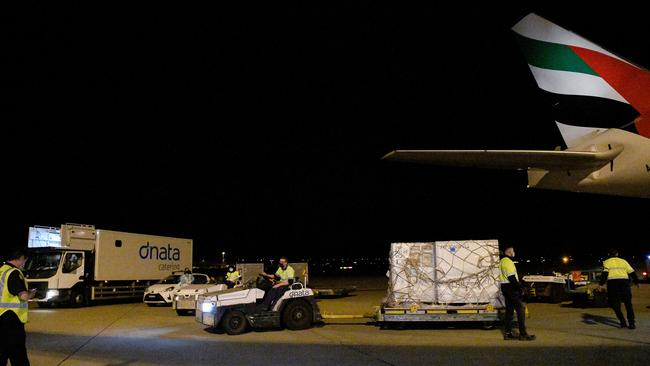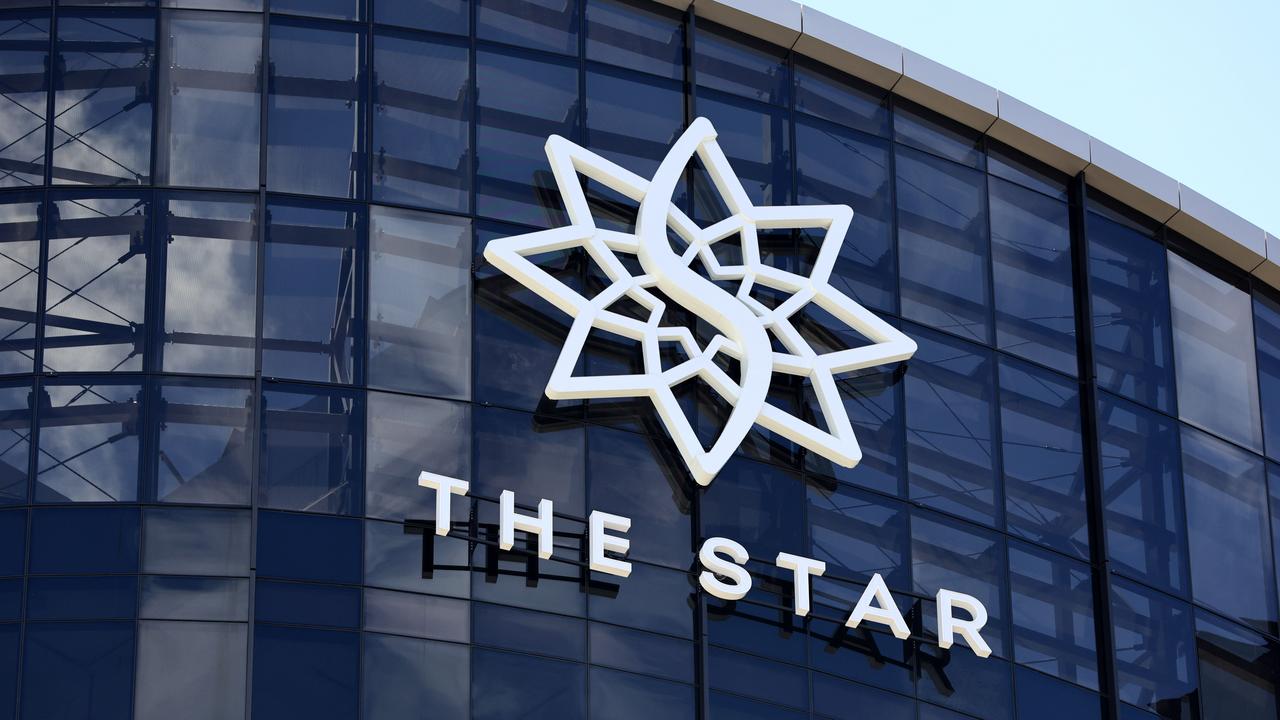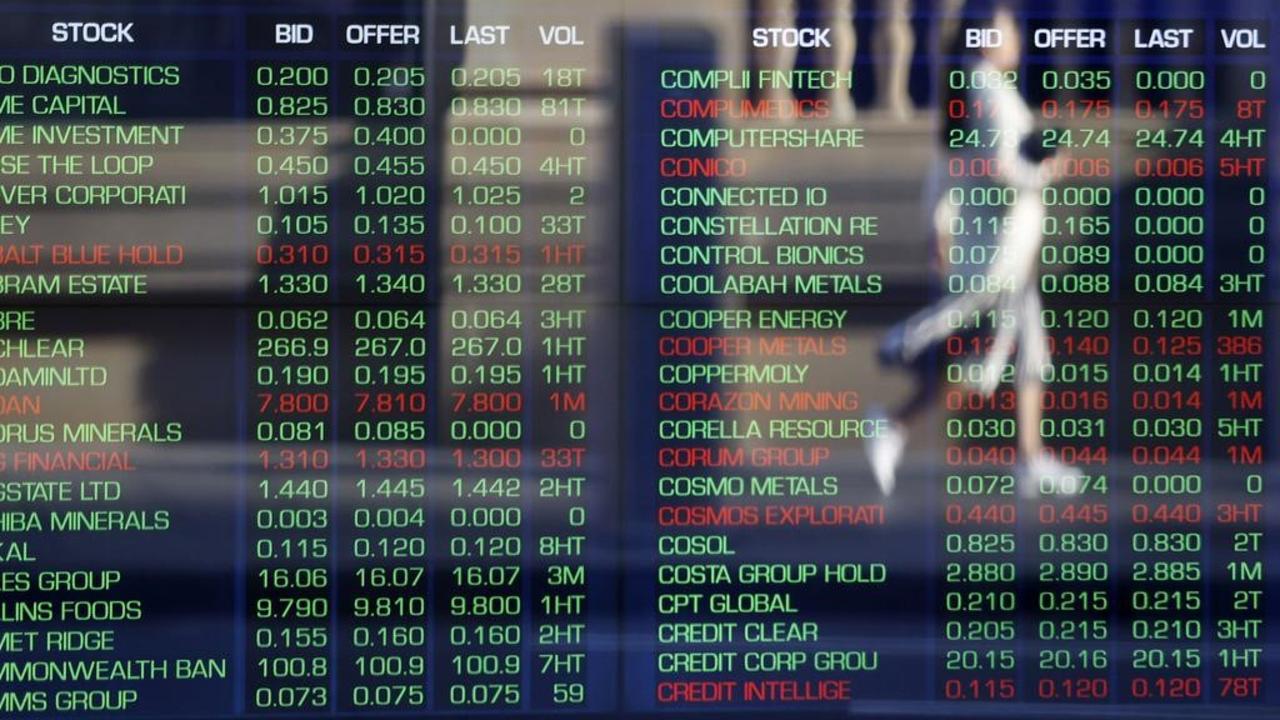Moderna eyes Covid-19 vaccine production in Australia
Moderna has confirmed it is in talks with the Australian government about shifting production of its Covid-19 vaccine technology down under.

Moderna’s chief medical officer Paul Burton says the company can “pivot quickly” its Covid-19 vaccine to rapidly evolving strains of coronavirus, as the highly contagious delta infects hundreds of Australians each day, outrunning contract tracers in NSW and Victoria.
And Dr Burton has confirmed the company is in talks with the Australian government about shifting production of its Covid-19 vaccine technology down under, with experts predicting the virus will be part of our lives for decades to come.
Dr Burton’s comments came as the first one million doses of Moderna’s coronavirus vaccine arrived in Australia at the weekend and are set to be distributed to community pharmacists by the end of the week.
Like Pfizer’s vaccine – the jab of choice for those aged under 60 – Moderna uses messenger RNA or mRNA technology, which instructs the body’s cells to make a protein that triggers an immune response against Covid-19.
Despite being the subject of research papers 30 years ago, and with development on its use in humans beginning a decade ago, it has taken the Covid-19 pandemic to thrust mRNA technology into the mainstream.
It is now being hailed as the next generation of vaccines, with Australia’s biggest health company CSL developing a influenza vaccine using the technology, with plans to build new factories in Melbourne that could produce two doses of mRNA vaccine for every Australian in 16 weeks.
Moderna — a portmanteau of the words mode and RNA — currently has 30 programs in clinical development for its mRNA technology, spanning vaccines for rare diseases, auto-immune conditions, cardiovascular disease and cancer — including “personalised cancer vaccines”.
“We can put 30 different individualised messenger RNAs in one cancer vaccine and give it to a person,” Dr Burton said.
And he said it can adapt to coronavirus mutations, which will be vital as the world shifts to living with the virus, which has morphed into thousands of variants circulating the globe, including Delta and the Beta strain, which was first identified in South Africa and has since spread to 20 other countries.
“We can combine mRNAs for different strains for different variants. We’ve even tested one, we have data, looking at one against the original strain, and then the beta variant, and we’ve got another one in clinic against beta and delta. So we can pivot them quickly,” Dr Burton said.
“We can look up, okay, what’s the big variant right now? Take the mRNA, put it into cassette, and then get it into patients. It’s a remarkably quick, high fidelity system and it generates, you know, just tremendously powerful clinical responses.”

Covid-19 has been a big winner for Moderna, with demand for vaccines catapulting the US biotech to its first quarterly profit this year. The company generated a profit of $US1.22bn ($1.68bn) in the first quarter, compared with a loss of $US124m in the previous corresponding period.
It reported a relatively high profit margin for the first quarter, with net income comprising 63 per cent of revenue. Momentum continued in the second quarter, with its rising to $US2.78bn versus a $117m loss the previous period. Overall, profit jumped to $US4bn in the six months to June 30, compared with a $US241m loss over the same period in 2020.
And the company expects demand for its vaccine to continue to rise after it warned that those who received its two-dose Covid-19 jab will need a booster shot during autumn to maintain strong protection against newer coronavirus strains.
Dr Burton confirmed Moderna was looking to start manufacturing booster shots in Australia, with the company in talks with the federal government about a potential partnership.
“We are looking to bring manufacturing to Australia, in Australia, for Australia by Australia, and we’re in discussions with the government about that, so that’s exciting,” Dr Burton told The Weekend Australian.
“We see Australia as a real hub for us. Our head of Asia Pacific medical affairs is going to be based in Australia. That‘s fantastic. There are fantastic investigators, fantastic clinical centres. Australia was a very important part of our global strategy for the mRNA platform.”
So far, Australia has been reliant on overseas companies and manufacturers to access mRNA technology, with the Morrison government cobbling together vaccine swap deals with Poland, the UK and Singapore to secure an extra five million doses of the Pfizer jab and accelerate the nations Covid-19 immunisation program.
Dr Buton said while he wasn’t across the full negotiations with the federal government, but expected a collaboration to be “firmed up within coming months, early 2022”.
Early in the pandemic, the government entered agreements with CSL to produce more than 51 million of the AstraZeneca vaccine in Melbourne, as well as the jab that CSL was developing with the University of Queensland (UQ).
But the UQ vaccine development was abandoned late last year after trials revealed it triggered false positives for HIV. Meanwhile, Australians have been hesitant to be inoculated with the AstraZeneca jab after it was linked to rare blood clots.
Vaccine hesitancy has become a significant challenge during, particularly as at least 70 per cent of the country needs to be fully immunised for restrictions to start to ease and international travel to resume.
It is something that Dr Burton is acutely aware of. Last month Japan suspended more than 1.6 million doses of the Moderna vaccine after vials were contaminated with foreign particles.
The source of the contamination was from a line change at the factory of its manufacturing partner ROVID Pharma Industrial Services, in Spain, which resulted in small metal particles entering the vaccine.
“We caught it, we found out why it happened. We’ve got you know, a very thorough corrective action plan in place. We did a very careful medical assessment, and you know, there really is no risk of these little tiny stainless steel particles – even if some that end up being injected,” Dr Burton said.
“They’re very tiny. The barrel of the syringe is, you know, three times a human hair. So it’s tiny, it isn’t a risk. But … people depend on us for a high quality product, and we’re committed to delivering that.”
The first two million doses of the Moderna vaccine that Australia will receive will come from Moderna’s Belgium plant.
Dr Burton stressed Moderna’s vaccine was safe, with more than 200 million doses administered so far across the globe.
“At the end of the day, I think you have to go back to the massive database that we have worldwide now. Looking at efficacy, looking at safety, it’s a fantastic platform,” he said.
The Therapeutic Goods Administration (TGA) has approved and the Australian Technical Advisory Group on Immunisation (ATAGI) has recommended the use of the Moderna vaccine for Australians aged 12 and over.
Health Minister Greg Hunt said the first one million doses will be “distributed to more than 1800 community pharmacies across the country and put into the arms of Australians in the next week”.
“A further 1800 community pharmacies across the country will start to receive doses the week commencing September 27,” Mr Hunt said.
“To date, we have administered over 24 million Covid-19 vaccines across Australia, with more than 70 per cent of Australians having received a first dose and 45 per cent having received a second dose. These are important achievements as we move closer, every day, to the vaccination rates required for us to safely reopen our country.”
Australia has an advance purchase agreement with Moderna to secure 25 million doses of the vaccine – 10 million this year and 15 million in 2022. The Moderna vaccine doses will go through the standard TGA batch-testing process as all other Covid-19 vaccines.






To join the conversation, please log in. Don't have an account? Register
Join the conversation, you are commenting as Logout